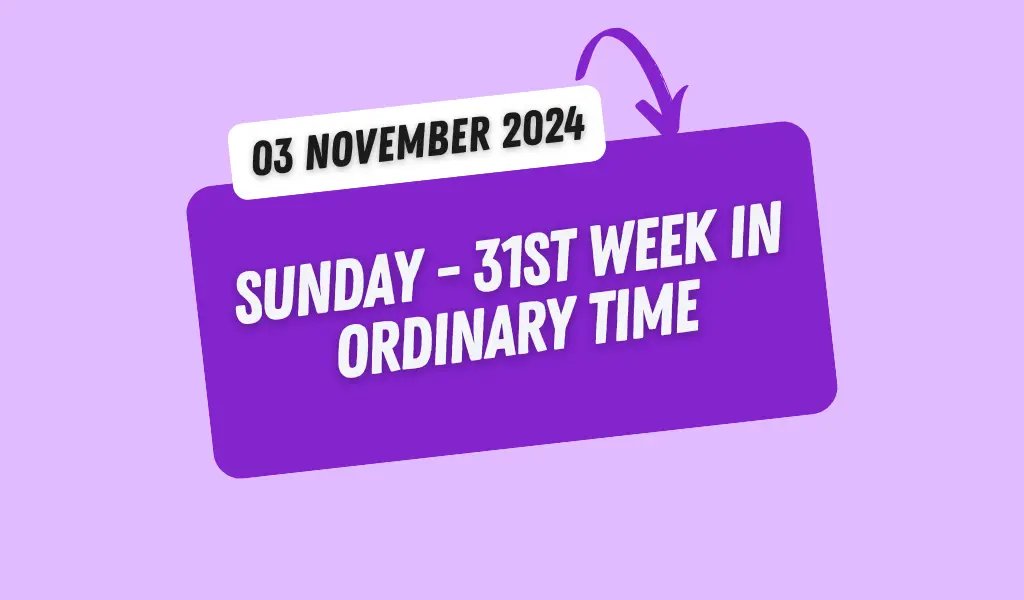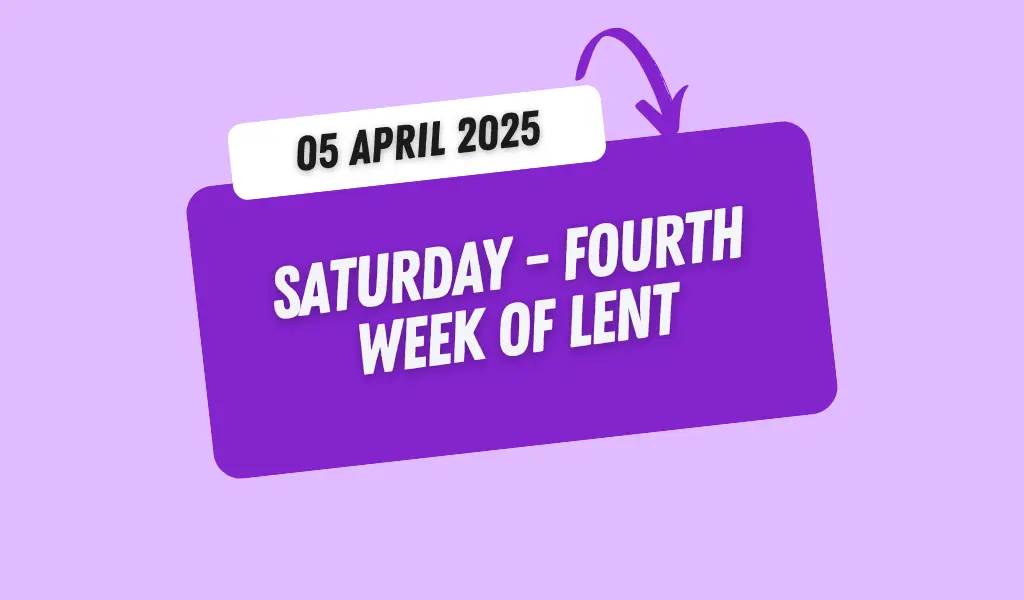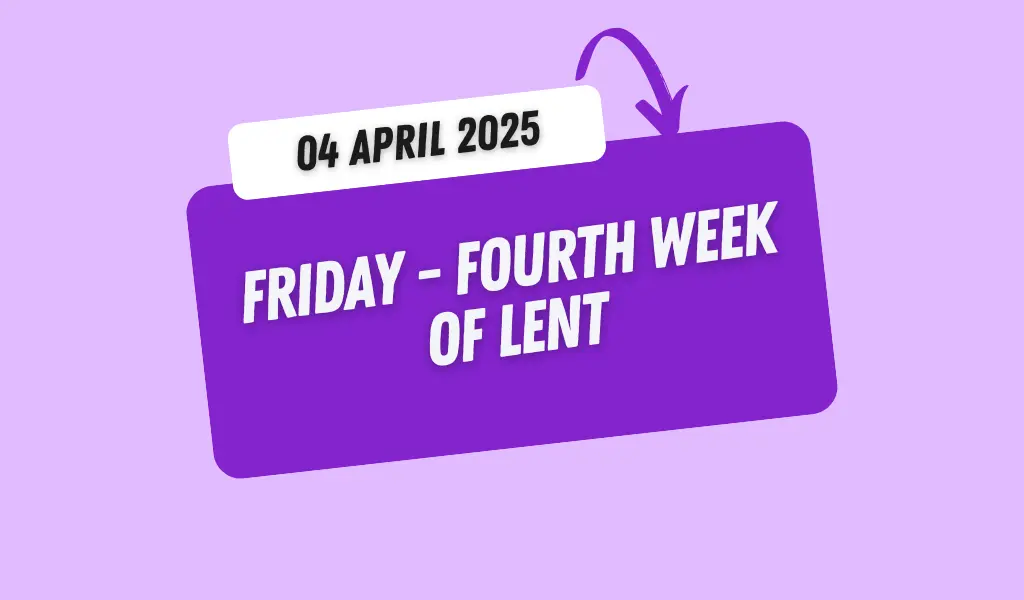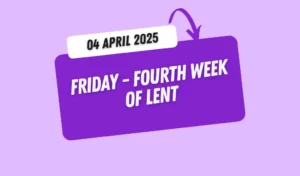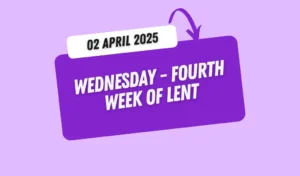Catholic Mass Readings and Reflection November 03, 2024
Thirty-First Week of Ordinary Time
03rd November 2024 (Sunday)
Psalter: Week 3
Reading of the Day
First Reading: Deuteronomy 6:2-6
Moses spoke to the people, saying, “you may fear the Lord your God, you and your son and your son’s son, by keeping all his statutes and his commandments, which I command you, all the days of your life, and that your days may be long. Hear therefore, O Israel, and be careful to do them, that it may go well with you, and that you may multiply greatly, as the Lord, the God of your fathers, has promised you, in a land flowing with milk and honey. Hear, O Israel: The Lord our God, the Lord is one. You shall love the Lord your God with all your heart and with all your soul and with all your might. And these words that I command you today shall be on your heart”.
Psalm 18:2-3a, 3bc-4, 47 and 51ab (R. 2)
R/. I love you, Lord, my strength
Second Reading: Hebrews 7:23-28
Brethren: The priests [of the former covenant] were many in number, because they were prevented by death from continuing in office, but he holds his priesthood permanently, because he continues for ever. Consequently, he is able to save to the uttermost those who draw near to God through him, since he always lives to make intercession for them. For it was indeed fitting that we should have such a high priest, holy, innocent, unstained, separated from sinners, and exalted above the heavens. He has no need, like those high priests, to offer sacrifices daily, first for his own sins and then for those of the people, since he did this once for all when he offered up himself. For the law appoints men in their weakness as high priests, but the word of the oath, which came later than the law, appoints a Son who has been made perfect for ever.
Gospel Acclamation
V/. Alleluia
R/. Alleluia
V/. If anyone loves me, he will keep my word, says the Lord; and my Father will love him, and we will come to him.
R/. Alleluia.
Gospel : Mark 12:28b-34
At that time: One of the scribes came up and heard them disputing with one another, and seeing that he answered them well, asked him, “Which commandment is the most important of all?” Jesus answered, “The most important is, ‘Hear, O Israel: The Lord our God, the Lord is one. And you shall love the Lord your God with all your heart and with all your soul and with all your mind and with all your strength.’ The second is this: ‘You shall love your neighbour as yourself.’ There is no other commandment greater than these.” And the scribe said to him, “You are right, Teacher. You have truly said that he is one, and there is no other besides him. And to love him with all the heart and with all the understanding and with all the strength, and to love one’s neighbour as oneself, is much more than all whole burnt offerings and sacrifices.” And when Jesus saw that he answered wisely, he said to him, “You are not far from the kingdom of God.” And after that no one dared to ask him any more questions.
Daily Gospel Reflection
Sunday – Thirty-First Sunday of Ordinary Time
Guidelines: Love is the essence of life and love alone can give meaning and beauty to life. A life devoid of love will be like a body without life
1. We are living in a world where there is total disarray and imbalance between two polarities: egoism is increasing but altruism is decreasing; slavery to religion is increasing but freedom of true religious spirit is decreasing; allegiance to tradition is increasing but adherence to true devotion is decreasing; spiritualities are increasing but true spirituality is decreasing. Prayers are increasing but the true spirit of prayer is decreasing
2. We find many who talk big and great things but in reality, live and do the opposite. They have more competence but less benevolence; more education but less dedication; more qualification but less edification; more specialization but less assimilation; more ability but less nobility; more capacity but less sagacity; more power but less fervour; more authority but less charity; more seniority but less sincerity.
3. Why such a dichotomous life? The sole reason is the decline of love. The culture of love is fast diminishing. Instead, a culture of hatred and resentment, and all its corollaries like negativity and retaliation, aggression and violence, hurt and destruction are rampant.
4. What then is the remedy and antidote? Obviously, only a revival and restoration of the culture of love is the only healing balm. This is what Jesus reminds us today in the gospel.
5. A certain scribe poses a question to Jesus, “Which is the greatest commandment of all?” Jesus’ answer is Love. It is a twofold love: love for God and love for the other. It is not two loves, but one love that has two aspects or dimensions objects. They are mutually inclusive and complementary in the sense one certainly leads to and enhances the other.
6. Both Love for God and love for the other not only complement each other but complete each other. This means that one cannot be true and perfect without the other. Jesus also qualifies both these loves.
7. Love for God is not what we mostly see, one that is confined to mere rituals and religious activities, one which is equated with offerings and some traditions. Such a love for God is only shallow and superfluous because it does not sink deep and does not touch the depths.
8. Instead, a true love for God is something profound, a passionate craving for God, an intimate relationship with Him, a total surrender to Him of whole mind, heart, and soul. It is without measure and reserve.
9. Such a love for God affects the whole person and whole life. God reigns supreme in everything and everywhere. God is the highest priority and He holds the foremost primacy in life. To love and please Him alone becomes the supreme norm and rule of life.
10. The beauty of Jesus’ teaching is to join together the love of God and the love of the other as one Love with two faces. In fact, both are one and the same love. In both, it is the full self that loves. The self loves fully both God and the other.
11. The whole self is the true self, the self in its perfection. One who partially loves is not loving with the whole and perfect love. Thus, a devotion that does not experience intimacy and surrender to God’s will is not true love. And a love for God that does not manifest itself in love for the other is also not credible.
12. Only a true self loves with true love. Only a full self loves with full love. One who loves the other truly and fully cannot be selfish, partial, biased, wicked, or harmful.
13. In fact, true and pure self-love sees one’s own self in the other. Thereby it loves itself in the other. That is why, true self-love cannot think of doing wrong or harm to the other, because it will be self-harming and self-destructive.
Practice: It is high time that we do an honest self-check about our love for God and love for the other. Often our love for God is replaced by love for worldly gods, and love for the other is replaced by love for ego.
